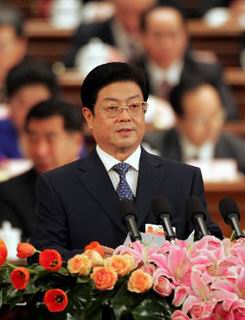China
China´s parliament starts reading draft laws on property, corporate tax
Source: Xinhuanet | 03-08-2007 09:25
Special Report: 2007 NPC & CPPCC sessions |
| NPC Vice chairman Wang Zhaoguo briefs on draft Property Law. Full Story >> |
BEIJING, March 8 (Xinhua) -- China's top legislature, the National People's Congress (NPC), on Thursday started examining two draft laws aimed to grant equal protection to state and private properties and introduce a unified income tax for domestic and foreign-funded enterprises.
The draft property law and the draft enterprises income tax law were submitted for deliberation to the ongoing annual full session of the Tenth NPC, as the lawmakers started their second plenary meeting in the Great Hall of the People in Beijing at 9 a.m. Thursday.
"Enacting the property law is necessitated by the need to uphold the basic socialist economic system...by the need to regulate the order of the socialist market economy...(and) by the need to safeguard the immediate interests of the people," said Wang Zhaoguo, vice chairman of the NPC Standing Committee, while reading an explanation on the law to the lawmakers.
The law is enacted to apply "the principle of equal protection to the property of the state, the collective and the individual in accordance with the provisions of the Constitution" and "strengthen the protection of state-owned property", Wang said.
He said under the conditions of the socialist market economy, which is stipulated in the Constitution, all players have equal status on the market, enjoy the same rights, observe the same rules and bear the same responsibilities.
"If the different subjects of the market are not provided with equal protection, or if the methods used for settling disputes or the legal responsibilities to be borne are varied, it will not be possible to develop the socialist market economy, nor will it be possible to uphold and improve the basic economic system of socialism," Wang said.
To prevent loss of state property, the draft strengthens the protection of state-owned property from five aspects, stipulating that illegal possession, looting, illegal sharing, withholding or destruction of state property is prohibited.
Those who cause loss of state property shall bear legal liability, according to a full text of the draft distributed to reporters at the session.
Wang said the law was also drafted with the principle of "giving a full and accurate expression to the basic policies of the Party in rural areas at the present stage" and was written to address the most urgent problems to coordinate all kinds of interests and promote harmony.
In order to grant the farmers a long-term and guaranteed land-use right, the draft property law stipulates that when farmers' land contracts expire, the contractor can have the contract renewed.
As part of the draft civil code, the property law was submitted to the NPC Standing Committee for the first review in 2002 after nearly 10 years of preparation.
To fully consider the interests of all social sectors, the law's drafters published the law to the public in July 2005 and pooled more than 10,000 suggestions.
After an unprecedented seven times of reading, NPC Standing Committee decided last December to put it for voting at the Fifth Session of the Tenth NPC, believing that the draft "represented a crystallization of the wisdom of the collective and was about to be mature".
China's legal experts said that the draft reflects China's basic socialist economic system and will help improve China's socialist market economy and speed up the building of harmonious socialist society once adopted.
Editor:Du Xiaodan



